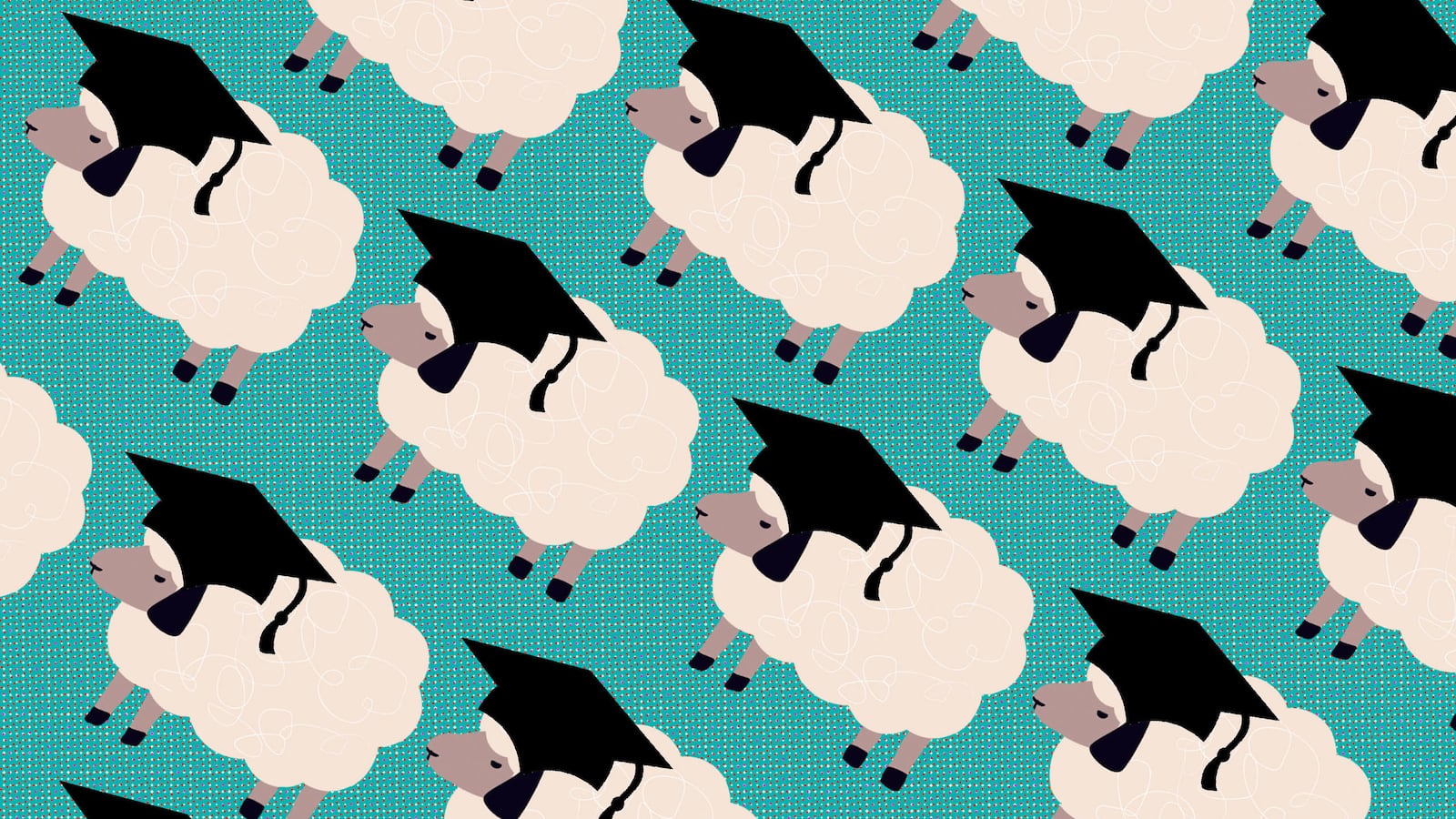I used to work at an elite Manhattan hedge fund that recruited almost exclusively from the Ivy League and its equivalents. My boss had gone to Yale, and I remember a striking story about him that circulated around the office: on the day he graduated from college, his mother told him he was the biggest disappointment of her life.
Why?
He had not graduated magna cum laude.
Apocryphal or not, the anecdote explained quite a bit. His personality combined a maniacal desire to please superiors, an indiscriminate craving for praise, and a combustible mix of grandiosity and insecurity. Many people had heard him hailing cabs in a British accent, as if he were a European aristocrat who had wandered onto the streets of Manhattan. He was actually from the Midwest.
The story would fit perfectly into William Deresiewicz’s provocative new book, Excellent Sheep: the Miseducation of The American Elite And the Way to a Meaningful Life. There’s an overbearing parent obsessed with minute gradations of prestige, a young and unhappy Ivy League graduate making money on Wall Street, and a famous school functioning as a factory of painful pathologies. Combinations of these elements appear in many of the stories Deresiewicz tells, and the broader conclusion that his anecdotes and arguments suggest is persuasive and unsettling: America’s elite educational institutions neglect and impoverish the souls of their students. They teach young people how to learn but not why; they create brilliant problem solvers with no idea which problems are worth solving.
Some critics, like Joshua Rothman in the New Yorker, think that Deresiewicz is pinning too much of the blame for modern maladies on colleges and universities: busyness, materialism, hunger for prestige, and purposelessness are not caused by contemporary education. He thinks they are larger problems of cultural modernity that go back at least 100 years. Rothman is right to notice older precedents for current conditions, but he doesn’t go back nearly far enough.
Many of the fundamental themes in Deresiewicz’s book were already familiar topics of debate in ancient Greece. And while it’s tempting to exonerate institutions by ascribing social ills to the broad and nebulous forces of modernity, Rothman misses the subtleties of Deresiewicz’s thesis and underestimates the central cultural role of school. This book is not about school in the narrow sense; it’s about the nature of a good life and the ways in which the influence of parents, teachers, peers, and places of learning can hinder or promote such a life.
Deresiewicz taught English at Yale for a decade, and he studied at Columbia for undergraduate and graduate school. He’s an anthropologist of the Ivy League, but he’s also a member of the tribe. That said, he’s doesn’t blindly accept its prevailing customs and self-image. Is the Ivy League diverse? No. Diversity of sex and ethnicity merely camouflages the underlying homogeneity of class: it’s the place rich people go to learn how to join the ruling class. Do elite schools provide a liberal arts education? No. They think they do, and they pride themselves on offering courses that don’t seem vocational, but in fact the motives with which students approach these courses usually render every subject vocational. If you study African history or Renaissance art only to prepare for law school or a consulting career, you’re not studying the subject for its own sake. You might fancy yourself more intellectual than someone who learns welding or plumbing, but you’re also simply studying as a means to the end of a career. He paraphrases John Ruskin, who reminded the 19th century elite that grabbing everything you can is no more virtuous when you do it with the power of your brains rather than the power of your fists.
Deresiewicz has a deeply religious view of the humanities. He thinks great works of art, philosophy, and literature should be more than intellectual playgrounds on which students perform analytical acrobatics to impress teachers. He wants these subjects to shape souls and teach students to live in different ways. A colleague of his once remarked that if fewer undergraduates went to work on Wall Street, they would still make mistakes. But at least they wouldn’t all make the same mistakes. In his vision the humanities are something like religion without the dogma; every claim is subject to searching and scrutiny, but the purpose of studying the humanities is to learn how to live your life.
The idea that education should profoundly influence how you live is at least as old as Plato. The philosopher once complained about young men whose desire for learning resembled their desire for a sun tan. They went to school for cosmetic reasons; the capacity to quote Homer at a symposium was just as important as fashionably bronzed skin. Plato argued that true learning must be more than what Deresiewicz calls “highbrow entertainment for the moneyed class.”
Socrates, Plato’s teacher, once compared himself to a stinging fly that roused the lazy horse of Athens from its indolent moral stupor. He roamed the streets of Athens asking people provocative questions that exposed uncomfortable contradictions in their beliefs. Deresiewicz also seems to envision teachers as ethical goads; they don’t prescribe a single right way to live, but they incite us to reflect on life choices and values critically.
In some ways Deresiewicz’s book is a plea to resurrect the lost art of Socratic questioning. Many teachers now think of the Socratic method as the technique of encouraging students to say whatever they know about a topic. But Socrates’ questions tend to elicit responses that reveal how little his interlocutors actually know. Ideally they perceive some of the chasm between what they know and what they think they know and are able to move closer to the Socratic standard of wisdom: knowing what you do not know.
The Socratic method also has a crucial ethical dimension. Often Socratic conversation induces utter confusion—the ancient Greek word is aporia—and ends with no clear solution to a problem. The experience of confusion is not only a necessary part of intellectual inquiry, it’s also a moral lesson in humility. Being forced to confront the limits of your knowledge and stumble through hazy realms of uncertainty is good for you; it instills what Deresiewicz calls in a wonderful phrase the “endlessly fertile condition of doubt.”
Are some of Deresiewicz’s claims about the elite educational system generalizations? Of course, but this invalidates them no more than the absence of cancer cells in some parts of the body discredits a global diagnosis that someone has cancer. He uses statistics, anecdotes, observations, and quotes from students themselves to establish the prevalence of unhealthy conditions beyond any reasonable doubt. Perhaps most poignant and revealing are the remarks of students. One comments: “I might be miserable, but were I not miserable, I wouldn’t be at Yale.” And another offers a remark that condenses much of the moral urgency and sadness of this incredible book: “It’s hard to build your soul when everyone around you is trying to sell theirs.”





